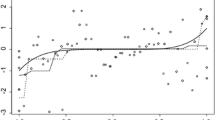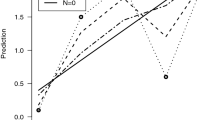Abstract
Let τ* be an exact D-optimal design for a given regression model Y τ = X τβ + Z τ. In this paper sufficient conditions are given for sesigning how the covariance matrix of Z τ may be changed so that not only τ* remains D-optimal but also that the best linear unbiased estimator (BLUE) of β stays fixed for the design τ*, although the covariance matrix of Z τ* is changed. Hence under these conditions a best, according to D-optimality, BLUE of β is known for the model with the changed covariance matrix. The results may also be considered as determination of exact D-optimal designs for regression models with special correlated observations where the covariance matrices are not fully known. Various examples are given, especially for regression with intercept term, polynomial regression, and straight-line regression. A real example in electrocardiography is treated shortly.
Similar content being viewed by others
References
Bickel, P. J. and Herzberg, A. M. (1979). Robustness of design against autocorrelation in time I: asymptotic theory, optimality for location and linear regression, Ann. Statist., 7, 77–95.
Bickel, P. J., Herzberg, A. M. and Schilling, M. (1981). Robustness of design against autocorrelation in time II: optimality, theoretical and numerical results for the first-order-autoregressive process, J. Amer. Statist. Assoc., 76, 870–877.
Bischoff, W. (1988). Über konkrete D-optimale Versuchspläne für die Geradenregression, Docteral Thesis, University of Karlsruhe.
Bischoff, W., Cremers, H. and Fieger, W. (1987). Optimal regression models in electrocardiography, Innovation et Technologie en Biologie et Medcine, 8, 24–34.
Budde, M. (1984). Optimale Zweifachblockpläne bei seriell korrelierten Fehlern, Metrika, 31, 203–213.
Cramér, H. (1963). Mathematical Methods of Statistics, Princeton University Press, New Jersey.
Federov, V. V. (1972). Theory of Optimal Experiments, Academic Press, New York.
Gaffke, N. (1987). On D-optimality of exact linear regression designs with minimum support, J. Statist. Plann. Inference, 15, 189–204.
Graybill, F. A. (1983). Matrices with Applications in Statistics, Wadsworth, Belmont, California.
Haberman, S. J. (1975). How much do Gauss-Markov and least squares estimates differ? A coordinate-free approach, Ann. Statist., 3, 982–990.
Karlin, S. and Studden, W. J. (1966). Optimal experimental designs, Ann. Math. Statist., 37, 783–815.
Kiefer, J. and Wynn, H. P. (1981). Optimum balanced block and Latin square designs for correlated observations, Ann. Statist., 9, 737–757.
Kruskal, W. (1968). When are Gauss-Markov and least squares estimators identical? A coordinate-free approach, Ann. Math. Statist., 39, 70–75.
Kunert, J. and Martin, R. J. (1987). On the optimality of finite Williams II(a) designs, Ann. Statist., 15, 1604–1628.
Näther, W. (1985). Exact designs for regression models with correlated errors, Statistics, 16, 479–484.
Sacks, J. and Ylvisaker, D. (1966). Design for regression problems with correlated errors, Ann. Math. Statist., 37, 66–89.
Sacks, J. and Ylvisaker, D. (1968). Design for regression problems with correlated errors: many parameters, Ann. Math. Statist., 39, 49–69.
Sacks, J. and Ylvisaker, D. (1970). Designs for regression problems with correlated errors III, Ann. Math. Statist., 41, 2057–2074.
Zyskind, G. (1967). On canonical forms non-negative covariance matrices and best and simple least squares linear estimators in linear models, Ann. Math. Statist., 38, 1092–1109.
Author information
Authors and Affiliations
About this article
Cite this article
Bischoff, W. On exact D-optimal designs for regression models with correlated observations. Ann Inst Stat Math 44, 229–238 (1992). https://doi.org/10.1007/BF00058638
Received:
Revised:
Issue Date:
DOI: https://doi.org/10.1007/BF00058638




